Toshiba KIRAbook Ultrabook Review
by Dustin Sklavos on May 9, 2013 12:01 AM ESTDisplay Quality
The Toshiba KIRAbook's claim to fame is its 2560x1440 13.3" IPS display, and that display really is a beauty. Viewing angles are excellent as one would expect, but there are two very minor issues. First, response time is good, but not great, and there's minor ghosting when dragging a window or the start screen. There's also backlight bleed on the edges of the display that's fairly typical of an edge-lit panel. Neither of these are dealbreakers and I'd still very easily take the KIRAbook's display over just about any competing notebook's, including the 1080p IPS stunner in the Dell XPS 13.
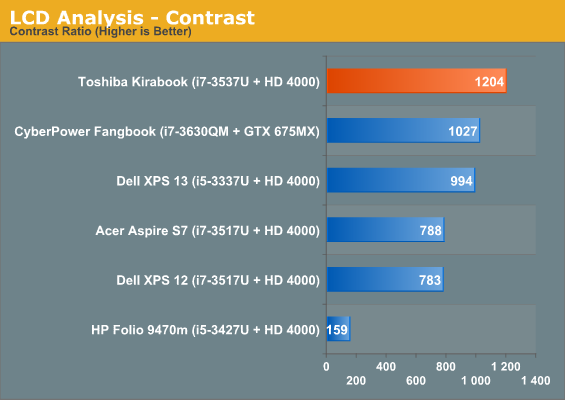
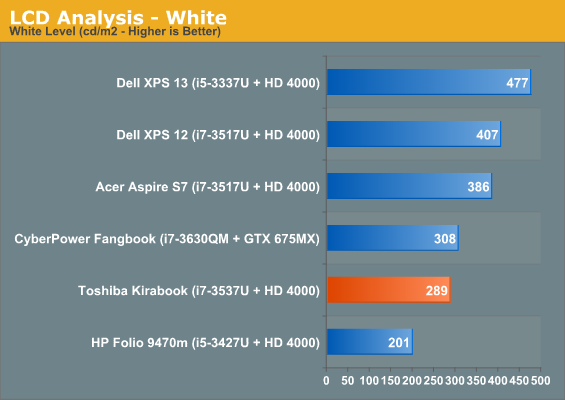
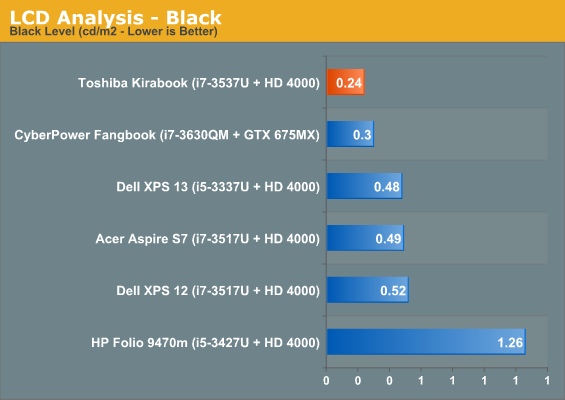
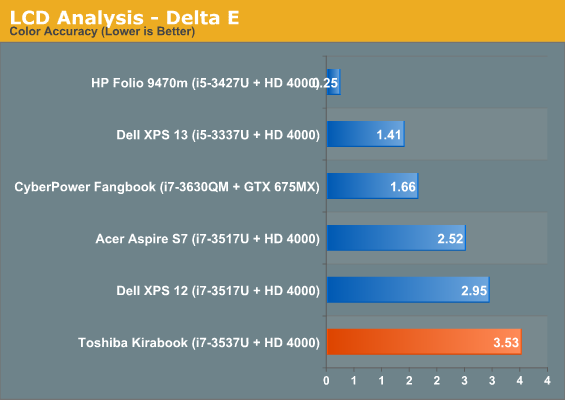
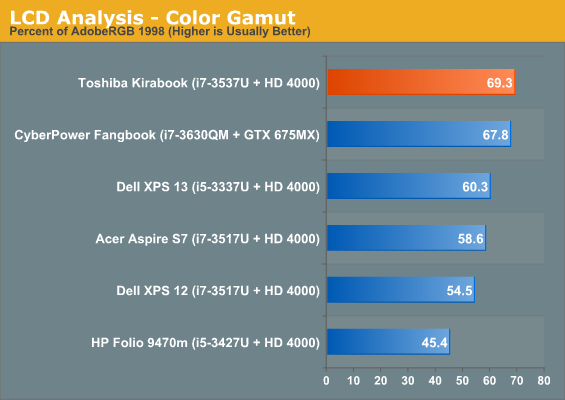
Everything about the KIRAbook's display screams quality except the measured delta-E, but in practice I found the display color to be plenty accurate and certainly worthy of the packed-in Adobe Photoshop Elements. Color gamut's quite good, brightness is beautiful without being excessive, and black levels are stellar. It's difficult not to be impressed with this panel.
Battery Life
When dealing with a high-resolution IPS panel, especially one as bright as the KIRAbook's, it can be hard to predict just how the battery life will play out. That's compounded by the fact that space for battery cells inside an ultrabook is always at a premium. The 52Wh integrated battery is at least slightly above average, though.
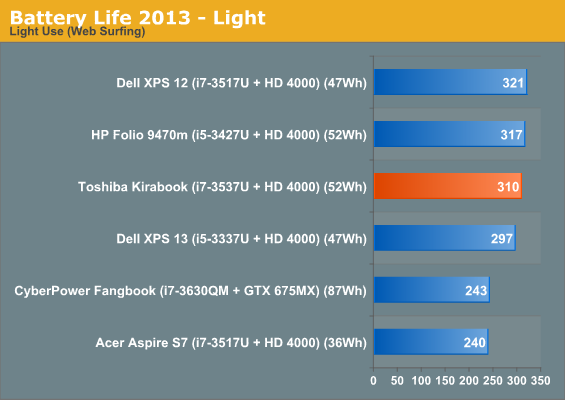
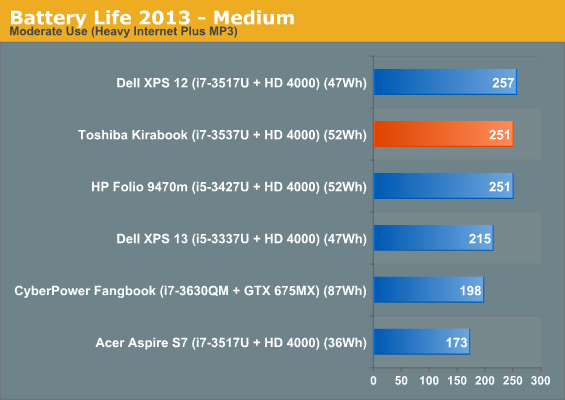
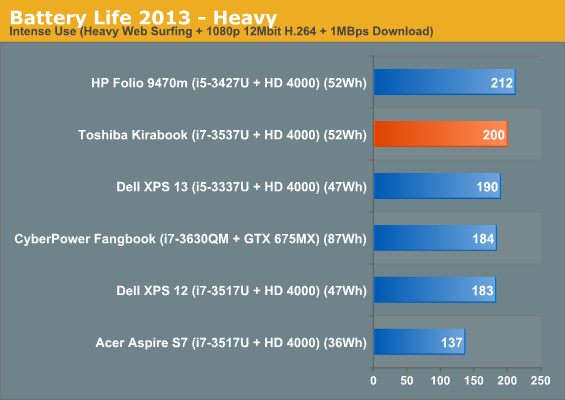
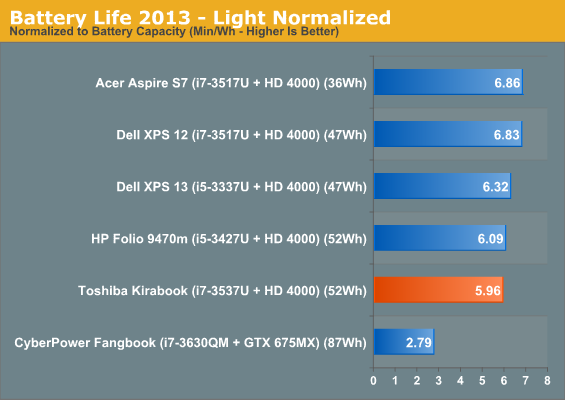
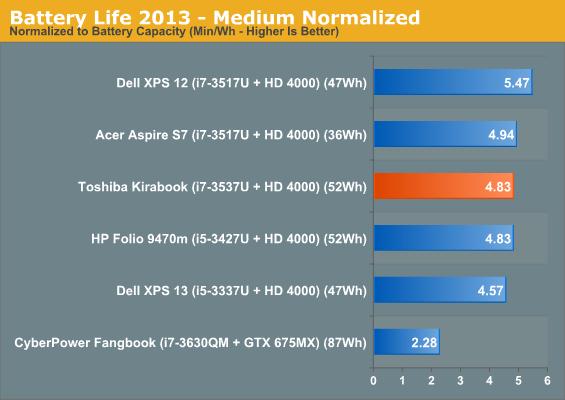
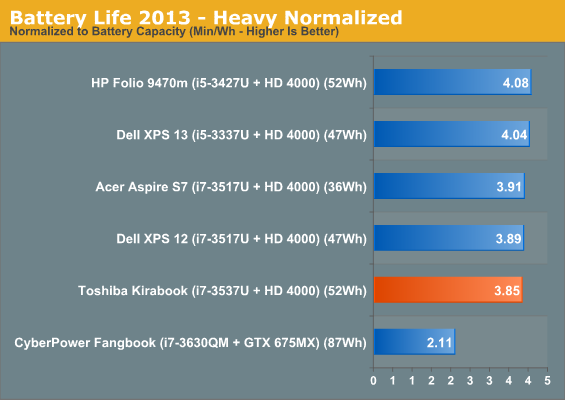
In broader terms, the KIRAbook produces battery life competitive with other ultrabooks in its class. When you normalize it, things look slightly worse, but not substantially so. There's clearly a very minor trade-off taking place to get that better display quality. That trade-off is largely negated by the slightly larger battery and substantially superior panel.
Heat and Noise
Toshiba made a big deal about the KIRAbook's cooling mechanism, but in practice this cooling system is essentially identical to the one in the Portege Z835. That worked out great for the Portege when we reviewed it, which featured a turbo-free Sandy Bridge low-voltage Core i3, but the KIRAbook has a harder time dealing with the horsepower of the i7-3537U.
Thermals under load are quite good, but noise is much less so. Idle noise is stellar; the KIRAbook is basically inaudible. Sustained load hitting the CPU causes the fan to spin up gradually, and again I lament the bottom-intake fan. During Cinebench R11.5 testing the i7-3537U spent most of its time at 2.3GHz, and it did take a good minute or so before noise the fan started spinning up, and a low narrow whooshing was eventually accompanied by a slight whine. Thankfully surface temperatures never got uncomfortable, though I'd recommend against touching the area near the hinge on the inside of the notebook.
A far as cooling systems go, this isn't necessarily a bad one, but I'd almost give up some of the ports on one side of the KIRAbook just to get side-oriented cooling. The Acer Aspire V5-171 I reviewed was a budget notebook just a touch too fat to get the ultrabook branding (to say nothing of the dismal stock hard drive), but that extra girth also allowed it to integrate a vastly superior cooling system that made it much more practical in the long run.


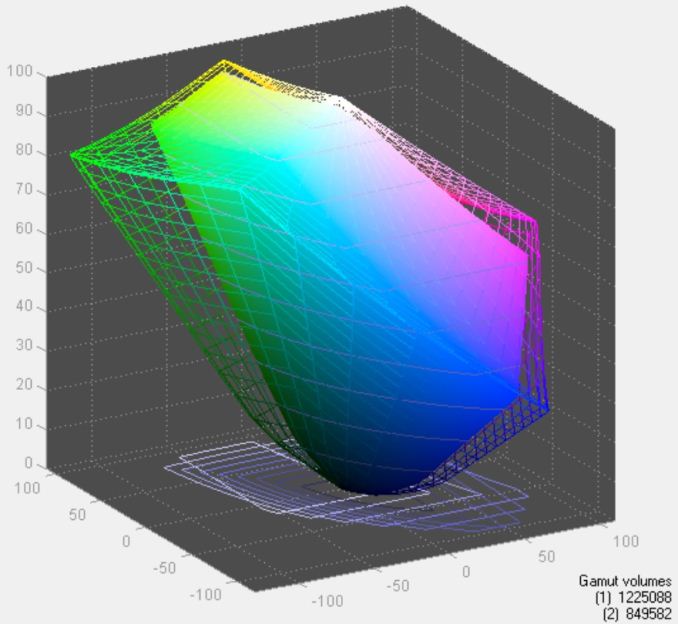
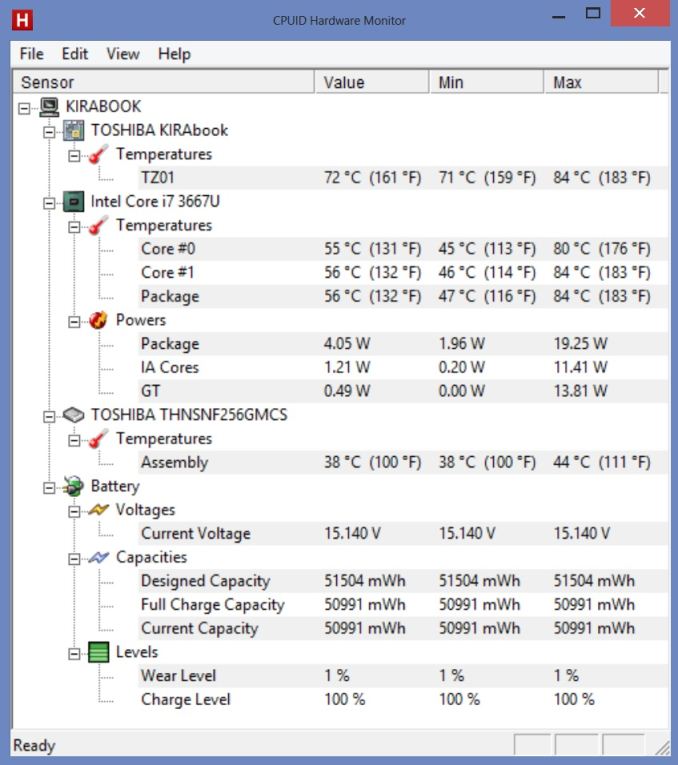








110 Comments
View All Comments
l_d_allan - Thursday, May 9, 2013 - link
Valuable review, but I'd find it helpful to also see "corrected De2k after calibration". Or did I miss that spec?wendoman - Thursday, May 9, 2013 - link
> if it's running Windows, you need to charge less for itWTF??? Apple OS X has no apps!
VivekGowri - Thursday, May 9, 2013 - link
Yeah, but from a "what sells" perspective, consumers at large seem hesitant to drop MacBook Pro money on any PC notebook unless it's an Alienware or similar. PCs have inherently less brand value, and so PC manufacturers can't charge equal (or in this case, more) money to a comparable Mac and hope to have a sales success. The PC industry destroyed that part of itself in the race to the bottom, and now nobody wants to pay more than $700 for a general purpose notebook. While it may not be fair, PC manufacturers cannot use Apple's price points and hope to win unless they ship a significantly more compelling product (see Zenbook Prime vs MacBook Air).mayankleoboy1 - Thursday, May 9, 2013 - link
"The PC industry destroyed that part of itself in the race to the bottom, and now nobody wants to pay more than $700 for a general purpose notebook"Very good point.
ananduser - Thursday, May 9, 2013 - link
Vivek...why should be pay more than 700$ for a general purpose notebook. Why shouldn't tech be a commodity ? Are we supposed to pay premiums on looks only(as Dustin said) ? We should care about the unit as it is and not that "it doesn't look as posh" crap that Dustin highlighted.I doubt that consumers that agree to pay more on macs are the same that are pondering a pc. Generally speaking macusers and pcusers are mutually exclusive. A macuser buys a mac for OSX that is exclusive to Apple. A pc user feels constrained about Apple's spartan choices and one size fits all solutions.
The main issue OEMs have is this. Ultrabooks are a more expensive choice within any OEM's lineup. In Apple's case you do not have a lower priced choice at all. The lineup starts with the MBA so if you want the entry level access to Apple's world you have to buy an ultrabook whether you like it or not. Thus it seems that people are validating ultrabooks when in fact they are aiming for the cheapest Apple unit and not the chipset type.
Hrel - Thursday, May 9, 2013 - link
"Posh" is such a fantastic wordp_giguere1 - Thursday, May 9, 2013 - link
They are.Apple has a philosophy of "Trust us to make sure every detail is perfect so you don't have to".
Your average consumer feels comfortable blindly buying any Apple product without reading this sort of comprehensive review or getting explained what a chipset or an ultrabook are. I can't blame them, that's exactly what Apple is trying to do and they are successful at it: delivering constant quality in order to gain trust and fidelity.
Any ultrabook that would have the exact same price and specs as a MacBook Air would sell much less than it. Would it be strictly because of Windows vs OS X, proving OS X is more popular at the same price point? I don't think so. It would be because the Mac would be pretty much guaranteed to have no major flaw and deliver decent and constant quality across all components, even the small ones people don't usually consider or are even aware exist until they have trouble with it. Apple cares about details and people are willing to pay more for this peace of mind.
On the other hand, ultrabooks, while costing more and offering better specs than you average $500 laptop, aren't guaranteed to be flawless and very well though-out computers. Some are, some aren't, and trying to figure out which one are is a pain in the ass a lot of consumers don't want to deal with. Somebody who doesn't already follow tech websites doesn't have the time and knowledge to start reading (and understanding) tens or hundreds of laptop reviews.
Bottom line: Time and peace of mind are worth something and reputation matters to people. People are willing to pay more for Apple's reputation of constant quality alone and it's perfectly normal.
bji - Thursday, May 9, 2013 - link
A well-thought out and logical post concerning Apple value vs. PC value in the Anandtech comments section? Is this even possible? Did Hell just freeze over or something? I am so confused!ananduser - Thursday, May 9, 2013 - link
This site is not about the average customers that blindly purchases macs. Furthermore time and peace or mind are not guaranteed with macs as are not guaranteed with any PC.Regardless of the willingness of the average Joe to spend whatever he wishes on macs, this site should not refrain, for example, from calling the vanilla mbp13" a poor choice(to say the least).
zepi - Thursday, May 9, 2013 - link
Imo Anand should grade their laptops over couple of axes, like "portability, performance, display quality and ergonomics". Price shouldn't even be mentioned or at most the MSRP could mentioned somewhere somewhere in small pring.As a customer I can sometimes find deals that are way under the MSRP if sales have been underwhelming and sometimes MSRP can be way too low considering the amount of units manufacturer can deliver.